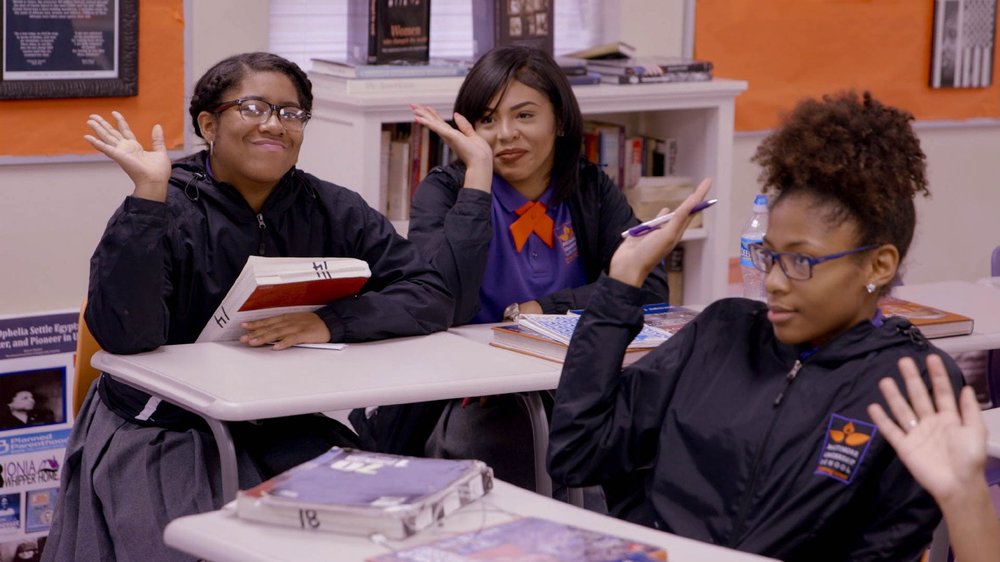Step (2017)


SHOULD I SEE IT?
YES
Hands down, Step is one of 2017's best films. See this as soon as you can.
Inspiring, effortlessly edited and crafted, Step is a movie that simply asks that you listen and observe the stories of three women who are likable, relatable, and easy to root for.
To the audience who embraced and celebrated Hidden Figures in 2016, Step does everything you loved about that movie and more. Plus, it brings forth all the feels and connects you in ways you simply won't anticipate.
NO
My one meager criticism of the film is that it runs just 83 minutes and could benefit from a longer running time.
I mean, if you are dead inside. Don't bother.
I'll refrain from saying something really crass, but if you cannot bring yourself to see Step and at least watch the stories it tells, perhaps you should take a long look at yourself in the mirror.
OUR REVIEW
A documentary that sounds like a can't miss prospect on paper, more than delivers as one of 2017's most memorable and moving film experiences. With Step, director Amanda Lipitz takes us into the lives of three young women who will be the first graduates of the Baltimore Leadership School For Young Women ("BLSYW"), Class of 2015.
But beyond that, Blessin Giraldo, Cori Grainger, and Tayla Solomon, the young women who serve as the focal point for the film, navigate the waters of their senior year, facing up to and conquering challenges both in and out of school, and finding an outlet for something of a personal release of tension, emotion, and energy, in step dancing.
As we open the film, we learn that BLSYW has a new step coach, "Coach G" - Gari McIntyre, and she informs the team that they are going to compete this year and take their performances to the next level. Immediately, a sense of purpose is introduced. Lipitz explores the graduation challenges and requirements standing in front of each of the girls, offering a second layer of importance to the film's proceedings.
On top of that, the film is set in Baltimore in 2015. Freddie Gray, a 25-year-old African-American man, arrested for perhaps holding an illegal switchblade, succumbed to a coma while being transported in the back of a police van. later dying as a result of severe trauma to his spinal cord. Of the six officers suspended during the investigation, no one was found guilty and charges were eventually dropped against three officers awaiting trial.
Lipitz does not go into Gray's death, or shift her focus to the protests which engulfed Baltimore in the days following the tragedy. However, Gray's story hovers in the air of Step, as the city tries to pick up the pieces, in the wake of other high-profile controversies involving black suspects dying at the hands of law enforcement. The percolating tensions between law enforcement and African-Americans in and around the city are palpable, if not seen explicitly on screen.
The raw emotions are clearly felt: One routine is inspired by the "Black Lives Matter" movement, which empowers these young women to speak through their art in a way that even the most bitter of people must acknowledge is the very definition of raw, pure, emotional release.

Where Step lives is in the words, the thoughts, and the faces of Blessin, Cori, and Tayla. It breathes the same air of guidance counselor Paula Dofat, tirelessly working to ensure that all the prospective Class of 2015 graduates earn good grades, staying on task, and passing tests to ensure they have a chance at a secondary education. Step soars in the gymnasiums, the dance studios, and on stage, where the step routines, choreographed by Coach G, speak so vivid, strong, and bold.
Lipitz finds such perfect synergy between performance, message, and reality that her film almost moves too quickly. At a concise and expedient 83 minutes, the lone criticism of the film might be that you simply do not spend enough time with these young women, or their mentors, learning about their lives. Their stories are a significant and important part of the tapestry being written and/or documented by the iGen, or Generation Z; those who have simply witnessed more and processed more literal data than any generation before them.
However, there is also a connection to the respective mothers and families of the young women featured here which elevates Step into the top tier of recent documentary filmmaking. Blessin, the student most in peril for graduation, has a mother who struggles to leave the house, often promising to attend parent nights and conferences but never showing up. For Cori, she is part of a new blended family and speaks few words, though in pole position to be valedictorian, with an eye on medical school. Tayla is equally inspired and embarrassed by her mother, a correctional officer, who dotes on the team and offers her assistance to Coach G whenever and wherever she can.
Dofat, Coach G, and principal Chevonne Hall each hold a place of influence and trust among the students and Lipitz gains access to deeply personal conversations and moments that never exploit, but always feel insightful. A level of trust envelopes these women and their storyteller and, as a result, we see truth in every frame.
With exhilarating dance numbers, honest drama and tension, and a brave step out of what is familiar, into a future offering risk and potentially great rewards, Step is a movie that nears perfection minute-by-minute, and story-by-story, and is among 2017's finest films.
CAST & CREW
Documentary Featuring: Blessin Giraldo, Cori Grainger, Tayla Solomon, Gari McIntyre, Paula Dofat, Chevonne Hall.
Director: Amanda Lipitz
Release Date: August 4, 2017
Fox Searchlight Pictures
